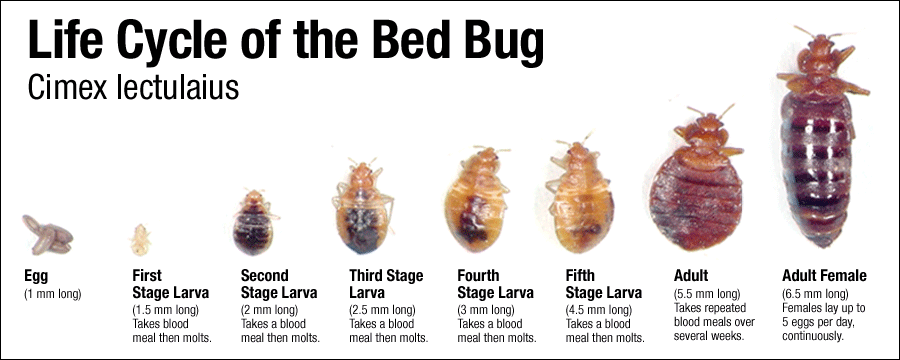Trusted Bed Bug Exterminator for Fast and Safe Elimination
Trusted Bed Bug Exterminator for Fast and Safe Elimination
Blog Article
Discover the Various Kinds Of Parasite and Their Treatment Alternatives for Effective Administration
The monitoring of bugs in both property and farming settings demands a detailed understanding of the different types that can invade these atmospheres, as well as the treatment choices available for reliable control. From home rats that posture health and wellness threats to garden pests that endanger crop yields, each group demands a customized technique. Comprehending the nuances of insect habits and the equivalent solutions is vital; however, the inquiry remains: what are one of the most reliable methods that not only resolve existing invasions yet additionally avoid future occurrences?

Common Family Vermin
Although family pests can vary considerably in kind and behavior, several share typical attributes that make them a problem. Usual household pests consist of rodents such as mice and rats, bugs like roaches and ants, and periodic invaders such as spiders and flies. These parasites commonly thrive in settings that offer easy access to food, shelter, and water, making homes specifically prone.
Rodents, for instance, are well-known for triggering structural damages and spreading out illness. Bugs like cockroaches are not just disturbing yet can likewise set off allergic reactions and bronchial asthma in delicate people.
Effective bug management starts with prevention, which includes sealing entry factors, keeping sanitation, and using proper storage space approaches for food. Understanding the practices and features of these typical household insects is necessary for efficient administration and maintaining a healthy and balanced living setting.
Yard Parasites and Their Impact
Garden parasites pose a significant hazard to the health and wellness and efficiency of plants, with some estimates suggesting that they can create approximately 40% of crop losses in specific regions. These parasites, that include insects such as caterpillars, aphids, and beetles, in addition to nematodes, can cause extreme damages by feeding on plant cells, leading to stunted development, reduced yields, and compromised quality.
The influence of yard bugs expands beyond plain aesthetic issues; they can interrupt ecosystems by altering food cycle, impacting pollinators, and spreading out conditions amongst plants. Parasites like the crawler mite can compromise plants, making them a lot more at risk to fungal infections. Intrusive types may outcompete native plants, leading to biodiversity loss.
Integrated Pest Administration (IPM) techniques, which combine biological control, social practices, and targeted chemical applications, can supply lasting services. By comprehending the particular insects and their actions, garden enthusiasts can apply targeted therapies that not just safeguard their plants yet also promote a much healthier yard environment.
Rats: Identification and Threats
Rodents are common yard pests that can posture substantial risks to plant health and wellness and total ecological community stability. These little mammals, including types such as computer mice, voles, and rats, are frequently recognized by their sharp incisor teeth and robust bodies. Their fur coloration varies extensively, ranging from grey to brown, and they usually show a long tail which aids in equilibrium and agility.
The threats associated with rodent infestations are multifaceted. Rats are well-known for their function as vectors of various diseases, consisting of hantavirus and leptospirosis, which can be sent to pets and people.
Additionally, rats can interfere with the natural equilibrium of neighborhood environments by taking on indigenous wild animals for sources. Their tunneling practices can result in dirt erosion and destabilization of plant origins. For that reason, early recognition and understanding of rodent behaviors and dangers are vital for effective bug management.
Efficient Treatment Approaches
When managing rodent problems, using effective therapy techniques is essential for decreasing damages and wellness risks. Break traps and digital traps supply a fast and gentle method to eliminate rodents, while glue traps can assist check activity levels.
Second of all, bait terminals containing rodenticides Our site can be purposefully put in areas of high rodent task. These stations ought to be tamper-resistant to guarantee the security of non-target animals and children. It is crucial to select the suitable bait kind, as rats can develop lure hostility if not changed periodically.
Along with catches and bait, securing access points can significantly minimize the possibilities of re-infestation. This involves checking and repairing spaces in doors, wall surfaces, and windows.
Lastly, specialist parasite control services can be beneficial for considerable infestations. They have the know-how, tools, and items necessary for efficient removal and can develop a customized management strategy. By executing these treatment methods, homeowner can efficiently resolve rodent problems and secure their health and building.
Preventative Steps and Tips

Keeping sanitation is just as vital; make sure that food is saved in impermeable containers and immediately tidy up crumbs or spills. Regularly throwing away garbage and making sure that compost stacks are taken care of effectively can prevent bugs from being brought in to your home.
In addition, consider landscaping practices that dissuade rodent habitation. Trim greenery and keep mulch far from the foundation of your home, as these can supply hiding areas for pests.
Verdict
Reliable bug administration necessitates an extensive understanding of numerous pest types and their particular therapy options. Eventually, a termite poison positive stance on bug management fosters a much healthier setting, guarding both farming and property areas from pest-related obstacles.
Usual home insects consist of rodents such as mice and rats, pests like cockroaches and ants, and periodic invaders such as crawlers and flies.Rodents are common yard bugs that can position considerable threats to plant wellness and overall ecosystem security. Early identification and understanding of rodent habits and threats are essential for efficient insect monitoring.
Reliable parasite administration begins long before a problem takes place, with aggressive measures that can dramatically decrease the possibility of rodent access and habitation.Efficient bug administration demands a thorough understanding of various bug types and their certain therapy options.
Report this page